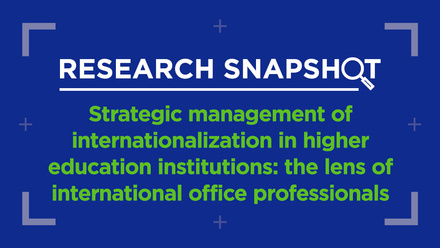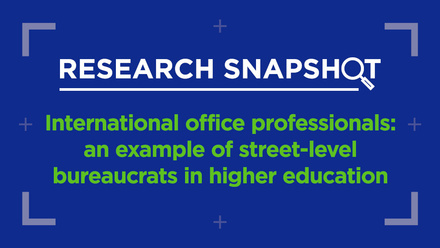Research Snapshot: Internationalised curriculum

Internationalisation of the Curriculum at Home (IoCaH): Why academic disciplines matter
Publication date: 23 January 2025
The study's purpose was to explore IoCaH rationales and practices across disciplines and contexts. It aimed to explore why top-down internationalisation strategies are implemented differently across disciplines and to highlight the under-investigated role of academic disciplines in this variation. The findings are intended to help higher education institutions leaders, educational developers, administrators, and educators better understand discipline-specific needs for internationalised curriculum design and implementation.
This research highlights the critical need for tailored curriculum internationalisation, moving beyond generic strategies to truly globalise discipline-specific learning.

Pouneh Eftekhari
Pouneh Eftekhari is a seasoned internationalisation professional with over 15 years of experience in policy development, strategic planning, and project implementation across the US and Europe. She has successfully fostered international collaborations and partnerships at various levels.
Her practical experience is complemented by her doctoral research, which explores the impact of disciplinary culture on academic engagement with curriculum internationalisation. Pouneh also leads an international research project that investigates the intersection of internationalisation and education development.
Her expertise is demonstrated through her journal publications, presentations at various international conferences and her certification by the European Consortium for Accreditation as an expert in assessing the quality of internationalisation.
Pouneh has been a member of the EAIE Thematic Committee Teaching, learning and curriculum since 2024.
Key findings from the research:
- Discipline-specific approaches are crucial: The study confirms that academic disciplines have unique rationales and preferred strategies for curriculum internationalisation. This indicates that generic, top-down internationalisation strategies are often ineffective, and understanding these discipline-specific nuances is vital for successful implementation.
- Clarifying disciplinary variation: Our findings underscore the necessity of disaggregating internationalisation research by discipline, cautioning that generalisations from previous studies can hinder effective curriculum internationalisation.
- Gap in learning outcomes and assessment: Despite the variety of (curriculum) internationalisation strategies identified, the study highlights that intended learning outcomes and assessment methods remain significantly under-explored across literature explored in this study. This is a critical gap, as clear learning outcomes and effective assessment are fundamental for evaluating student progress and the success of an internationalised curriculum.






